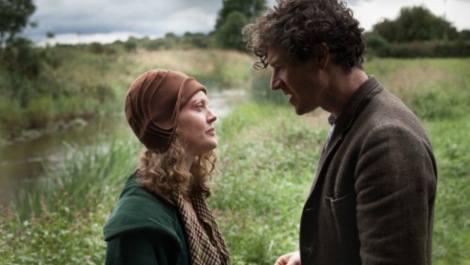Why you can trust GamesRadar+
If Ken Loach is to be believed, Jimmy’s Hall might be the last feature film of his long and illustrious career. If so, then he’s departing on a gentle, tender note, with this study of real-life Irish activist Jimmy Gralton. The only man ever to be deported from Ireland, Gralton (played by Barry Ward) returned from a 10-year stint in the US in the wake of the Great Depression to find himself clashing with the Catholic Church.
A Communist sympathiser, Gralton takes it upon himself to re-open the county hall when he returns to County Leitrim in 1932 (ostensibly to look after his mother). Refurbished, the hall becomes a makeshift community centre, hosting everything from woodwork classes to boxing lessons to poetry discussions. But what really gets up the noses of the Church, led by the stuffy Father Sheridan (Jim Norton), are the dances – not least because the youthful self-expression is beyond their control.
Written by Loach’s regular screenwriter Paul Laverty with his usual care and consideration, Jimmy’s Hall doesn’t quite boast the blood-and-thunder of their previous Irish-set drama, the Cannes-winning The Wind That Shakes The Barley . Rather, it’s one man’s persecution at a time when revolution was brewing (the parallels to Biblical times and Christ are there for all to see) in the wake of a civil war when, as one priest put it, “we suffered great violence – brother against brother”.
There’s also a less successful misty-eyed subplot, involving Jimmy and his former love Oonagh (Simone Kirby), while some of the supporting turns around the charismatic Ward are rather stilted. But Loach clearly hasn’t forgotten how to wring humour from the bleakest of situations; witness the scene with Jimmy’s mother (Aileen Henry) distracting the police while they search for her son. All told, it’s perhaps best seen as a celebration of a man who stands up for his beliefs – almost like a testament to Loach himself.
Verdict:
Rough around the edges, Jimmy’s Hall isn’t quite up there with Loach’s classics. But in its own way, it’s just as heartfelt, honest and committed as any of his work.



James Mottram is a freelance film journalist, author of books that dive deep into films like Die Hard and Tenet, and a regular guest on the Total Film podcast. You'll find his writings on GamesRadar+ and Total Film, and in newspapers and magazines from across the world like The Times, The Independent, The i, Metro, The National, Marie Claire, and MindFood.



